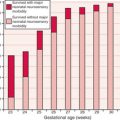CHAPTER 26 Maternal infections
Viral disorders
Hepatitis B
Prophylaxis
• For babies born to HBsAg-positive mothers, the generally accepted approach is to give the baby hepatitis B immunoglobulin (100 IU, intramuscular, in Australia) as well as the hepatitis B immunisation in the opposite limb. Immunoglobulin should ideally be given before 12 hours of age. This regimen results in >90% protection.
• Before commencing the above schedule, it should be discussed with the parents, or at least the mother, when possible. However, if the mother is unavailable (e.g. after a general anaesthetic), the immunoglobulin should be given anyway. This is just as important as treating pneumonia with antibiotics.
Immunisation
• In Australia, this begins at birth and the dose is 5 μg, given by intramuscular injection. Other countries use 10 μg.
• Immunisation should be administered in hospital prior to discharge (when the baby is ‘physiologically stable’) and preferably in the first 24 hours of life.
Hepatitis C virus (HCV)
• Breastfeeding is not contraindicated but should be stopped if the mother’s nipples are cracked or bleeding.
• There is currently no uniform recommendation for how and when to screen infants born to HCV-positive mothers. Some recommend serology between 6 and 12 months, but specificity is low because passively transferred maternal antibodies can persist until about 18 months. Others delay serology testing until after 18 months. HCV PCR may be available but has been shown to have low sensitivity in the first few months after birth.
Varicella
• Zoster immunoglobulin (ZIG) should be given to any baby whose mother develops varicella up to 7 days before delivery or up to 28 days after delivery.
• Intravenous aciclovir should be given:
— to babies presenting with chickenpox who are unwell (e.g. poor feeding, tachypnoea), whether or not they received ZIG
• There is no evidence to support the use of routine aciclovir prophylaxis in conjunction with ZIG and it is not currently recommended in neonates.
• A mother and/or her baby with active vesicles should be isolated from other mothers and babies, but an infected mother does not need to be isolated from her own baby.
[Heuchan A, Isaacs D, on behalf of the Australasian Subgroup in Paediatric Infectious Diseases of the Australasian Society for Infectious Diseases. The management of varicella-zoster virus exposure and infection in pregnancy and the newborn period. Med J Australia 2001;174:288–292.]
Herpes
• The risk of transmission from an infected mother to her vaginally delivered baby is estimated to be <5% for active recurrent genital herpes, and up to 50% for primary infection. For infants delivered by Caesarean section with membranes ruptured for less than 4 hours, the transmission risk is very low.
• All infants born to mothers with active herpes infection should be carefully examined and observed for signs of infection.
• Infants born to mothers with recurrent infection, and who have no signs of infection, are not routinely treated with aciclovir.
There are two general approaches to infants born to mothers with primary genital infection.
1. The first approach is to collect swabs within 48 hours of birth from the mouth, conjunctivae, nasopharynx and rectum for HSV PCR (polymease chain reaction) or culture — if positive then treat with aciclovir.
2. The alternative approach is to treat all babies with aciclovir from birth after collecting swabs as above.
When collecting a swab from a skin lesion, de-roof the lesion and swab from the base.
Human immunodeficiency virus (HIV)
• Babies born to HIV-positive mothers should be treated with zidovudine (2 mg/kg every 6 hours orally) for the first 6 weeks of life. This has been shown to reduce the risk of transmission by about two-thirds.
Syphilis
• Infants born to mothers with a history of adequately treated syphilis (who have not been reinfected) usually require no specific treatment but must be evaluated for evidence of infection: examine the infant carefully and check antibody titre (RPR, rapid plasma reagin test).
• All babies born to mothers with a history of syphilis should be followed up to document a negative RPR.




